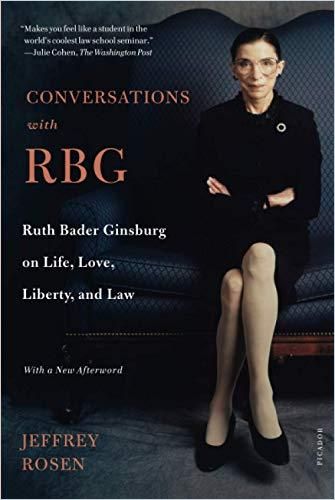Legal scholar Jeffrey Rosen presents decades of interviews with Ruth Bader Ginsburg highlighting her brilliance and fortitude.

Ginsburg Speaks
Author Jeffrey Rosen interviewed Ruth Bader Ginsburg throughout her career. A law professor at George Washington University, an Atlantic contributing writer, and president and CEO of the National Constitution Center, he presents an informed, compelling and complete portrait of Ginsburg’s thoughts on the law, civil rights, abortion, the Constitution and the Supreme Court. Their conversations provide fascinating insight into Ginsburg’s brilliance and explain why her victories and outspoken dissents made her an American icon to many and a reviled pillar of liberalism to others.
Others scholars have expressed their admiration of Rosen’s presentation. For example, Jill Lepore, author of These Truths: A History of the United States, said, “Ruth Bader Ginsburg’s vantage on American law and politics is without equal. This collection of interviews, conducted over decades…gets to the very heart of her understanding of the Constitution.” Publisher’s Weekly said, “Rosen’s…straightforward interview style allows Ginsburg’s exceptional legal mind to take center stage.”
Gender Discrimination
In her early landmark cases, Ruth Bader Ginsburg sought to overturn laws based on the tradition of men as breadwinners and women as homemakers. She approached these changes incrementally and strategically.
There comes the point when the discrimination is staring you in the face, and you have to make a stand.Ruth Bader Ginsburg
Ginsburg’s first Supreme Court case was her victory in Reed v. Reed – the first time the court had held a law unconstitutional due to gender discrimination.
Roe v. Wade
In the 1973 Roe v. Wade ruling, Rosen explains, the Supreme Court obviated excessive government restrictions on abortion because such laws undermined women’s privacy and doctors’ rights to do as they thought best for their patients.Ginsburg criticized the ruling because she feared it would increase antiabortion opposition. Disapproving feminists, Rosen argues, failed to recognize her long-term vision and strategic thinking.
Ginsburg believed that one of a lawyer’s great responsibilities is to defend people’s civil liberties.
If we don’t protect the people we don’t like, we’re going to lose protection for ourselves.Ruth Bader Ginsburg
She held that citizens must protect everyone’s liberty, even when they disagreed with someone’s viewpoint. This means achieving a balance between allowing freedom of speech and not allowing that freedom to harm others.
Women Justices
When Ginsburg joined the Supreme Court in 1993, Rosen reminds readers, she served with Sandra Day O’Connor, the first female associate justice. O’Connor and Ginsburg fought against gender stereotypes. For example, disrespectful attorneys would call Ginsburg by O’Connor’s name because, they said, they were accustomed to speaking to only one female justice.
Before Ginsburg’s death, Rosen points out, the Supreme Court had three women associate justices – Ginsburg, Elena Kagan and Sonia Sotomayor. Ginsburg hoped an all-female court might be possible someday.
Judicial Minimalism
Ginsburg believed that well-argued dissents informed future court rulings and could overturn faulty original decisions. When she was in the minority, she wanted other justices in the minority to agree on a joint dissenting opinion rather than separate ones. She believed this gave the dissent greater weight.
Ginsburg maintained that the court should refrain from judicial activism with two exceptions: when a law contradicted the Constitution and when it disadvantaged people by discrimination. Ginsburg believed change happens from the ground up, through political activism and shifts in people’s circumstances.
Equality
Ginsburg championed feminism and believed society can achieve true equality between men and women only when men accept equal responsibility for childraising. She and her husband, noted tax attorney Marty Ginsburg, took that approach in raising their own children. She argued that part-time judgeships for women with children or child-raising benefits for mothers reintroduced the prejudicial belief that women need special protection under the law.
Ginsburg supported the #MeToo movement while stressing the importance of due process and the right of accused people to defend themselves and to be presumed innocent until proven guilty.
Women generations before said the same things my generation was saying, but they did so at a time when no one, or precious few, were prepared to listen.
Ruth Bader Ginsburg
Ginsburg suggested that an independent adjudicator could ensure fairness in any civil proceeding against the accused in harassment cases.
Moral Courage
Ginsburg emerges from Rosen’s interviews as a quintessential dedicated, stubborn liberal from an earlier generation, one who fought for everything she gained and never backed down. Her moral courage, intellectual scope and determination might inspire anyone, regardless of political affiliation. Students and professors of US law and history, attorneys, judges, politicians, policymakers and any readers interested in public policy can learn a great deal from studying Ginsburg’s astonishing career.
If this serves as your introduction to Ruth Bader Ginsburg, you might want to read her own books, I Know This To Be True and My Own Words. Compelling books about Ginsburg include Irin Carmon and Shana Knizhnik’s Notorious RBG, Jane Sherron De Hart’s Ruth Bader Ginsburg and Mary Zaia’s You Can’t Spell Truth Without Ruth.








